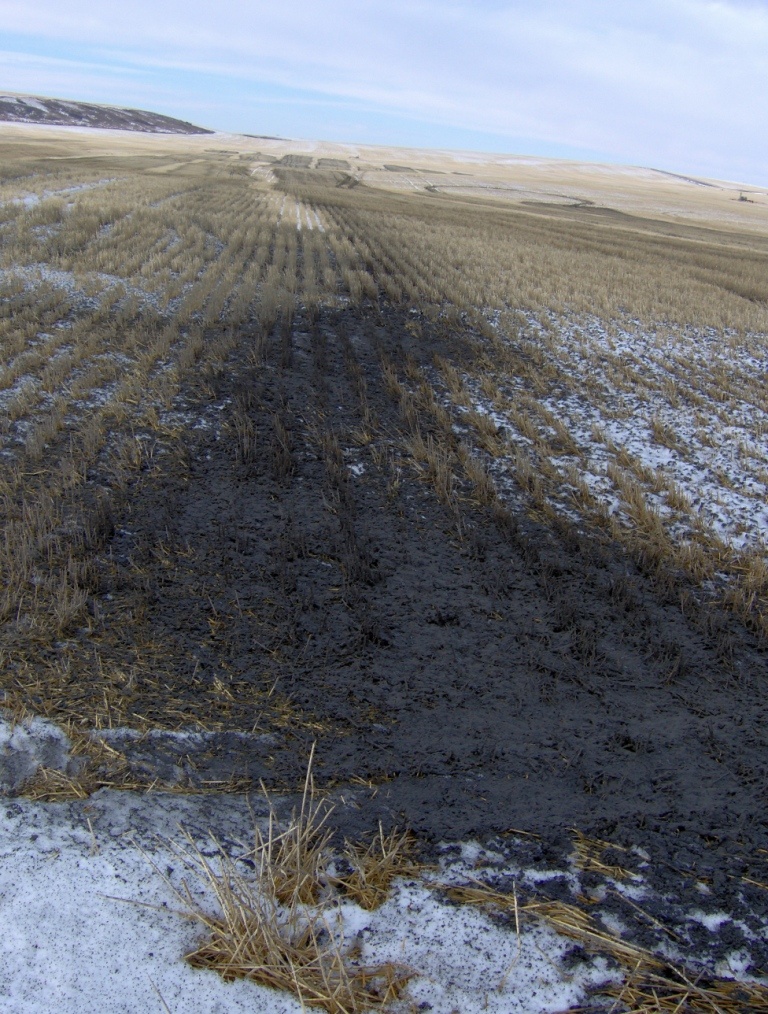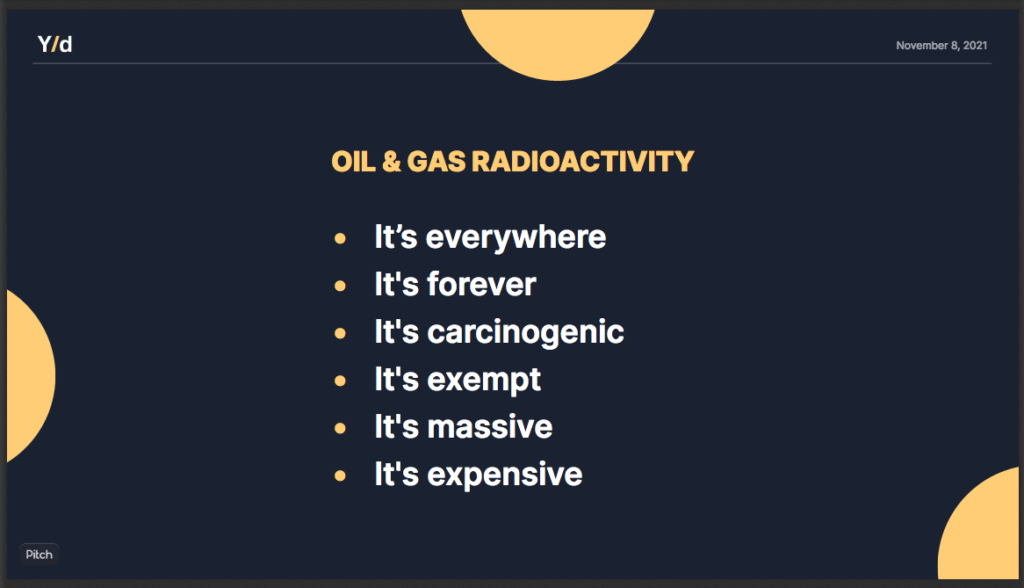PDF of the presentations. Recording of the webinar will be posted when it’s available. Two of Melissa Troutman’s slides:

In Alberta, companies (including bully brute Encana/Ovintiv) dump their waste on crop and pasture lands, with AER nowhere to be seen:

What’s in the bread, cereal and meat you eat and feed to your children?

At an online event: Monday, November 8th, 2021 3:00pm MST
Experts from Public Herald and beyond will present a detailed analysis of the link between the growing financial burden of the radioactive nature of the oil and gas industry, and policy solutions. These financial risks have never been publicly measured to date, and will certainly shake investors to the core once they’re unearthed.
Hosted by Yield Studio and sponsored by ARO Working Group
MEDIA CONTACT:
Melissa Troutman (YIELD), email hidden; JavaScript is required, 724-388-0464
Kate Christensen (350 Colorado), email hidden; JavaScript is required, 303-910-3217
Phillip Doe (Be the Change – CO), email hidden; JavaScript is required, 303-949-6986
Oil and gas industry radioactivity is increasing financial risk, lawmakers must protect taxpayers, Experts to discuss rising radioactive costs in online forum Nov. 8th Press Release, Oct 25, 2021
COLORADO – Radioactivity from oil and gas operations is elevating financial risk for states and the federal government, all of which lack full, up front financial assurance from companies to close and clean up their oil and gas wells. On top of already insufficient bonds, forfeited to regulators to plug wells that companies abandon, new rules that close long-standing loopholes for the industry’s radioactive and hazardous waste are increasing financial liability.
At an online event on Monday, November 8th, 2021 at 3:00pm Mountain Time, experts will present an analysis of the growing financial burden of oil and gas radioactivity. Experts include Justin Nobel, award-winning author of “America’s Radioactive Secret” (Rolling Stone, 2020), Weston Wilson, U.S. EPA environmental engineer and whistleblower (Be The Change – Colorado), and Melissa Troutman, oil and gas waste policy expert and award-winning documentary filmmaker (INVISIBLE HAND, 2020). The public can register for the event at http://criticalstate.org/forum.
The estimated cost to clean up and plug millions of old, leaking oil and gas wells in the U.S. is $280 billion, but this estimate does not include the increasing cost to properly handle and dispose of industry’s radioactive waste as decades-long loopholes begin to close.
In Colorado, the estimated cost to plug and remediate orphaned wells more than doubled in 2021 to a high of over $290,000 per well due to “new environmental sampling requirements [as of] January 2021. Colorado enacted new rules in January that increase radioactive sampling of oilfield waste.
Colorado’s new cost to plug and remediate aligns with the $307,500 average cost to plug and remediate oil and gas wells in North Dakota. But these plugging and remediation costs far exceed the bonds collected by these states and others to cover them. The Colorado Oil and Gas Conservation Commission (COGCC) is currently updating the state’s financial assurance rules for operators in order to secure sufficient bonds and could therefore serve as a model for other states. However, COGCC’s latest draft rules fail to do so.
EPA whistleblower Wes Wilson, a resident of Colorado, states, “While the COGCC apparently acknowledges that new rules governing oil and gas radioactive waste greatly increase the financial burden to companies and the state, their latest draft Financial Assurance rule ignores these cost increases, actually retreats from bonding for each well, and relies upon minimal blanket bonding. Management of the industry’s radioactive wastes will increase costs for well closure, and with future bankruptcies, also the cost to taxpayers.”
After decades of federal and state exemptions from hazardous waste law, the full cost of handling the industry’s radioactive waste is finally coming to bear – in 2020, New York State closed its hazardous waste loophole for oil and gas operations. Pennsylvania legislators introduced bills in 2020 and 2021 to explicitly regulate radioactive material from oil and gas operations. And in January 2021, new rules governing technically-enhanced naturally-occurring radioactive material (TENORM) became effective in Colorado, significantly increasing the industry’s costs to drill and eventually close oil and gas wells.
“Increased accountability for oil and gas TENORM means increased costs for industry and the state, depending on who ends up remediating and plugging wells. States like Colorado can reduce financial risk to taxpayers by enacting single well full bonding that includes the increasing costs to properly handle oil and gas radioactive material,” said Troutman.
The climate advocacy group 350 Colorado is joined by dozens of organizations in calling for a pause in permitting until proper financial assurance for oil and gas operations, including radioactivity, is secured.
“Oil and gas companies have been operating at the expense of Colorado taxpayers since they started drilling in this state,” said 350 CO Oil and Gas Campaign Coordinator Kate Christensen. “They leave us abandoned wells and infrastructure and a legacy of radiation that will likely be detrimental to the health of future generations and an enormous cost burden for this state. Governor Polis and his regulators need to hold the oil and gas companies accountable now, while we still can, before CEOs pay themselves millions, lay off workers, and declare bankruptcy – again.”
The COGCC will hold its next round of public hearings on its financial assurance rulemaking on Nov. 9th and 10th. The Nov. 8th event, Radioactive Costs of Oil & Gas, is sponsored by ARO Working Group and hosted by YIELD Studio. Register at criticalstate.org/forum.
***
About YIELD: Yield is a design studio that collaborates with organizations, entities and foundations on climate-related risk and other systemic issues.
About ARO Working Group: ARO Working Group is a multi-disciplinary network focused on financial risk tied to Asset Retirement Obligations of oil and gas companies.
About 350 Colorado: 350 Colorado is building the local grassroots movement to solve the climate crisis and transition to a sustainable future.
About Be the Change – Colorado: Be the Change USA is a grassroots political organization which promotes progressive issues and principles.
